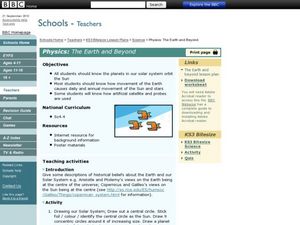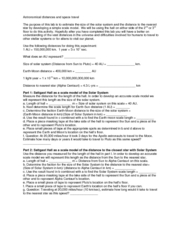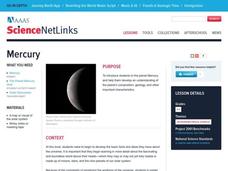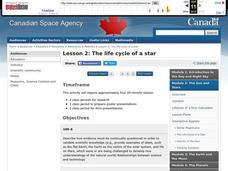Curated OER
Discovering Our Planets
Fifth graders use a website to research the planets. They complete an activity sheet and discuss their planet facts. They demonstrate revolution and rotation.
Curated OER
Planets an Introduction
Fourth graders investigate one planet, enter information into a database, and print the database sorting for each of the attributes.
Curated OER
Inner Planets
Students create a booklet about the inner planets after researching the characteristics of each planet. Students research the following items for each planet: moons, size, rotation, orbit, atmosphere, an interesting fact. Their final...
Space Awareness
Sun, Earth and Moon Model
The moon orbits Earth while the Earth is rotating, and the Earth revolves around the sun. This can be a tricky concept for young astronomers. Implement an activity that helps distinguish between the movements of Earth's systems around...
Teach Engineering
Manned Mission to Mars
To go or to not to go — the question for a mission to Mars. This resource provides details for a possible manned mission to Mars. Details include a launch schedule, what life would be like on the surface, and how the astronauts would...
S2tem Centers SC
Seasons
Winter, spring, summer, and fall—take the learning of the seasons beyond the elementary level to the middle school classroom. Curious learners begin by watching videos about the seasons and the rotation of planet Earth. Then,...
Ventura County Air Pollution Control District
Effects of Global Warming
Your learners have probably heard of climate change, but do they really understand what it is? Study the history, details, and future implications of global warming and the greenhouse effect with a set of activities designed for an...
Curated OER
Galaxy Adventure
Working in groups, learners create a mnemonic device, give an oral presentation, and create a pictorial representation of the correct sequence of the planets and asteroid belt from the sun. An assessment rubric is included in the lesson.
Curated OER
Traveling the Planets!
Fourth graders research the planets and create brochures to share their information. In this planets lesson, 4th graders navigate the Internet to gather information for a brochure about an imaginary trip to their planet....
Curated OER
Physics The Earth and Beyond
Fourth graders will explore our solar system. In this physics lesson plan students create a model of the solar system to explore the movement of Earth, the Sun, and stars.
Curated OER
PLANETS IN PROPORTION
Students discover scales for both the solar bodies' relative sizes and their distances from the sun. They find equatorial circumference and volumes of their solar bodies. Students apply estimation strategies and proportioanl reasoning to...
Curated OER
Be A Planet
Students identify the name, order and attributes of the planets. They role play the position of planets, and draw pictures of the planets as well.
Curated OER
The Best of the Solar System (Grades 4-7)
Students explore planetary research and become familiar with the planets and their characteristics. They compare and contrasts planets and moons.
Curated OER
Astronomical Distances and Space Travel
Students estimate the size of the solar system and the distance to the nearest star. In this space instructional activity students complete calculations and use Sattgast Hall as a scale model.
Curated OER
Astronomy and Me: Moons Over New Haven
Third graders study the features of different moons orbiting the planets. For this astronomy lesson, 3rd graders explore the different phases of the moon using an interactive online website. They compare and contrast the features of the...
Curated OER
The Sun-Earth Connection
Third graders research about the location of different planets from the sun. In this earth science lesson, 3rd graders discuss the weather in their place and identify common weather terminologies. They explain how tornadoes form and...
Curated OER
Mercury
Students study the planet Mercury and develop an understanding of the planet's composition, geology, and other important characteristics. They explore a Web resource on the planet Mercury which is the central focus of this lesson.
Curated OER
The Life Cycle of a Star
Students investigate the life cycle of a star and make conclusions based on evidence, research, and observation. In this lesson on space and scientific investigation, students describe the relationships between science and...
Messenger Education
Look But Don’t Touch—Exploration with Remote Sensing
Mars is home to the tallest mountain in our solar system, Olympus Mons. In this set of two activities, learners review geologic land formations through the analysis of aerial maps. They then apply this knowledge to aerial maps of objects...
University of Colorado
Are All Asteroids' Surfaces the Same Age?
There are more than 600,000 asteroids in our solar system. Pupils analyze images of two asteroids in order to determine if they are the same age. They count craters for each asteroid and compare numbers.
Space Awareness
History of the Universe
Your pupils may believe that you and their parents are the oldest things in the universe, but surprise! There are elements of the universe that are even older. Elementary scientists create a class timeline to demonstrate the...
Curated OER
Solar System Distance Activity
Students examine the distances between the Sun, planets, and smaller objects in the Solar System. They design a model using beads that shows the scale distances of the Solar System using astronomical units converted into a 10 centimeter...
Science Matters
Thermal Energy Flow in Materials
The sun sends the earth 35,000 times the amount of energy required by all of us on the entire planet, every day. The fourth lesson in the 10-part series looks at how light energy from the sun transfers into thermal energy. Scholars build...
Curated OER
The Discovery of the Solar System
Students explain the observed motion of the planets. The inner ones move back-and-forth across the position of the Sun, while the outer ones usually advance in one direction, but with occasional temporary reversals known as "retrograde...























